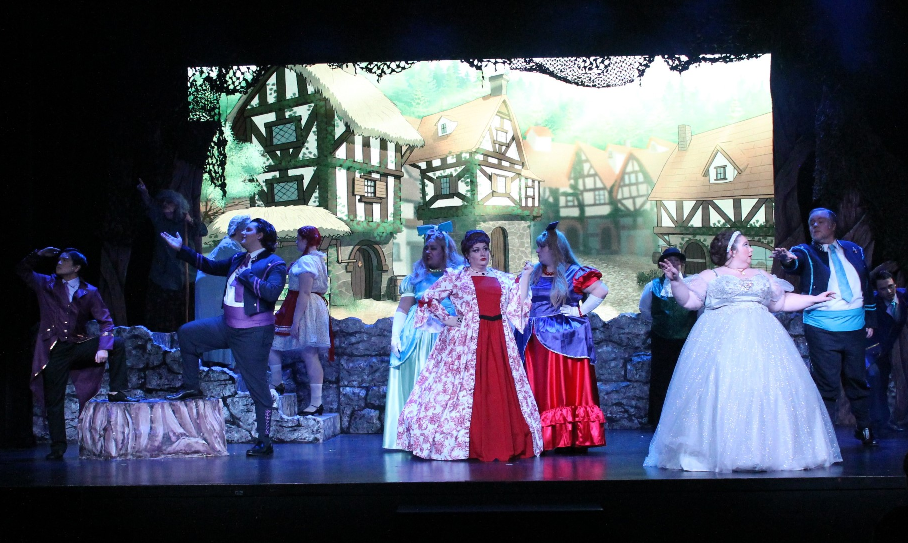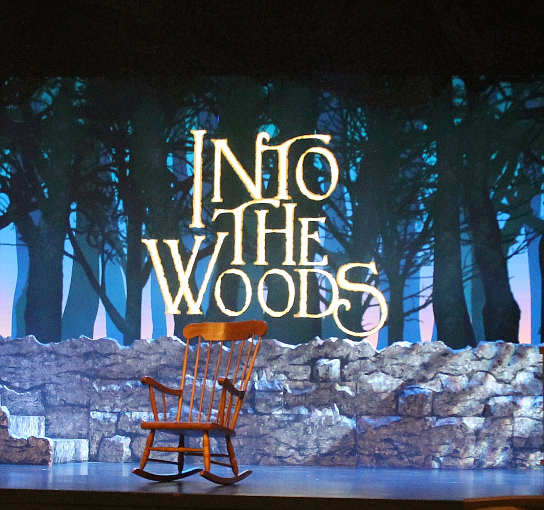Witches Can Be Right and Giants Can Be Good
March 12, 2024 at 11:37 a.m.
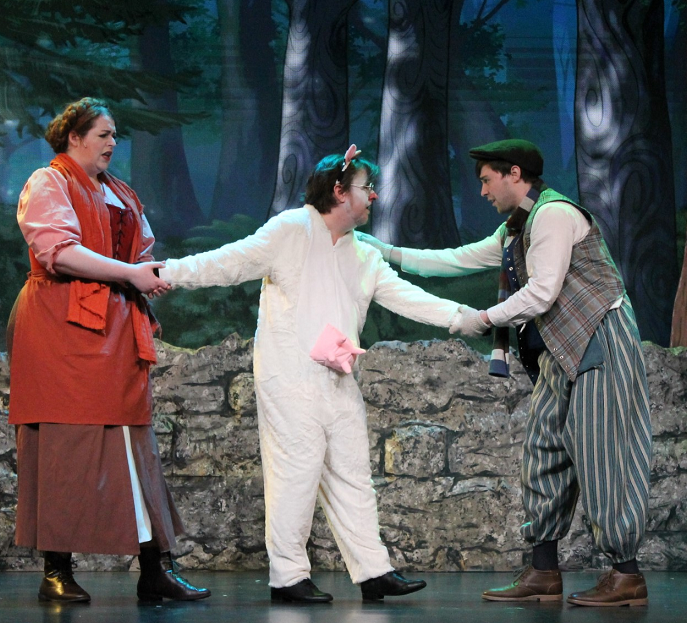
“We live in a world where children are exposed to dangers from every direction, even via their phones, and those who seek to do them harm have become increasingly emboldened and deceptive, so the challenges of parenting are more diverse than ever,” said Suzie Newbury, who is the co-director of the current production by Auburn Community Players.
The story on some levels is about hopes and wishes. It also is about ethics. Into the Woods follows a Baker and his wife who wish to have a child, along with Cinderella who wishes to attend the King's Festival. Jack and his mother wish their cow would give milk. When the Baker and his wife learn that they cannot have a child because of a witch's curse, the two set off on a journey to break the curse.
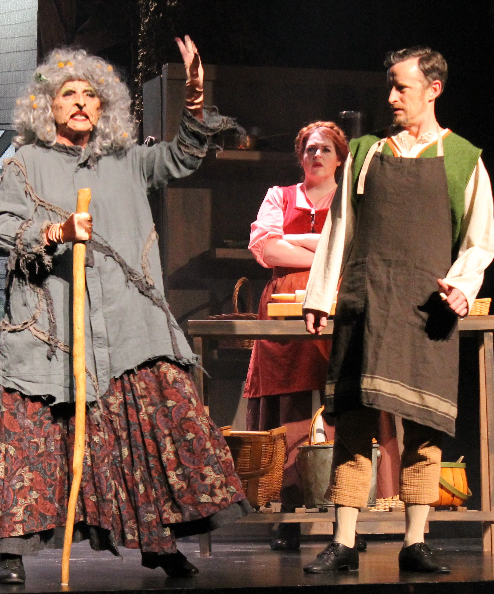 The Witch with the Baker and the Baker's wife
The Witch with the Baker and the Baker's wife
The stories are very familiar with Cinderella, Jack and the Beanstalk, Rapunzel, and Little Red Riding Hood. Stephen Sondheim and James Lapine, who wrote this show, have woven these characters into a new story of the Baker and the Baker's Wife trying to have a child. “Their desire to have a child, juxtaposed with the stories we have all known forever, allow us to imagine how these cautionary tales might impact how they raise their newest generation. We think our audiences, especially those who have been through the raising of children, will enjoy seeing these stories told with an adult audience in mind, and in a new light,” said co-director Joe Blotner.
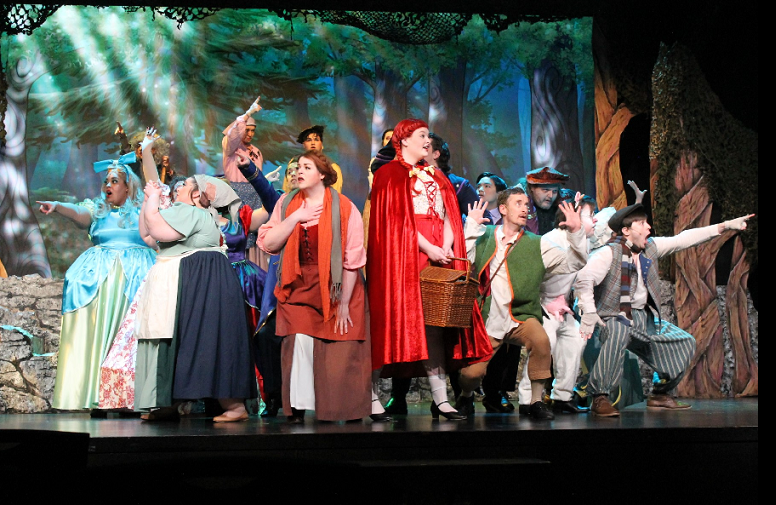 The entire cast is seen at the end of the opening number, bringing together the well-known storybook characters that appear in the play
The entire cast is seen at the end of the opening number, bringing together the well-known storybook characters that appear in the play
Newbury and Blotner have co-directed Godspell, Bring it On, Crimes of the Heart, Working, and Agatha Christie's The Hollow. Joe has performed most recently as Gomez in The Addams Family and Daddy Warbucks in Annie.
Newbury said this show may especially appeal to older adults. “Our hope is that our audiences will find moments that resonate with their pasts, as well as offer a little food for thought for the future,” said Blotner, who is 56 years old. “This is the seventh play we have directed together, and we try to take on projects only if we believe we can bring a unique viewpoint to them. Into the Woods is arguably Sondheim's most produced play, so audiences have expectations on what they'll see, and we want to honor that.”
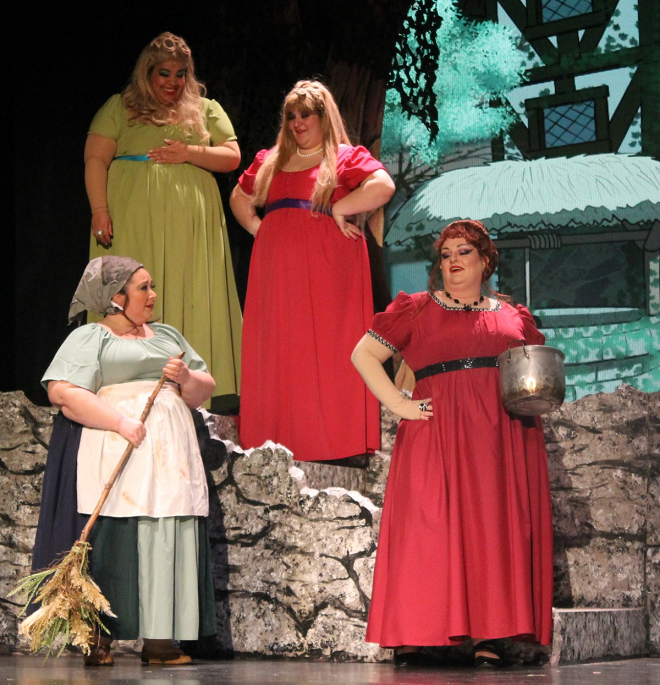 Cinderella and the Step-Family
Cinderella and the Step-Family
The story begins with Little Red Riding Hood. Like most little girls, she is innocent and trusting that all adults are there to help her. However, she discovers in a violent fashion that is not the case. “She emerges from this trauma as a toughened, arrogant badass. Her song I Know Things Now, and her interaction with Jack, will remind audiences of typical teenagers. They've been through one growth moment, and suddenly they know everything,” said Newbury, who is 57 years old. “Red's second transformation is more subtle. After all of her boasting and bravado, she ultimately struggles with the morality of killing the giant, concerned that her mother and grandmother would be very upset by these circumstances.”
Careful What You Say
Children Will Listen is a brilliant song, especially in the climate of divisiveness we live in today. The original Grimm fairy tales are very stark on what's right and what's wrong, and on who's good and who's evil. The original tales are quite cavalier about murder when the "good" characters kill the "evil" characters.
The show makes the audience think about their own ethics and what they would do for their child or to become pregnant. There are definite moments where the characters we are supposed to root for make choices that upset us. When Red says that wolves "aren't the same" as people, the witch responds with "ask a wolf's mother." When the villagers want the giant to leave them alone, she says, "That boy asked for shelter. Then he killed my husband."
Even though fairy tales group people into "good" or "bad," real life just doesn't work that way, and this new production in Auburn of Into the Woods does a fantastic job of bringing out this point. An incredibly moving song, No One Is Alone, contains the lyrics "witches can be right / Giants can be good / You decide what's right / You decide what's good / You decide alone / But, no one is alone." These are highly powerful and moving lyrics sung by two children in this story (Red and Jack) who are wrestling simultaneously with how their stories are ending.
“As the parents of three grown children, we know firsthand how difficult it is to balance protecting our children and equipping them for adulthood, and we thought we could draw this theme out through this play. Our instinct as parents is always to fiercely protect our children, but we have an equally critical mandate to prepare them for being competent adults, who can navigate the world without us, and build their own social circles,” said Newbury.
One of the major themes is that children need to fight their own battles, learn from their own pain, and form their own world views, but they aren't alone. “We're there to support them and that's actually the primary theme we see in the show. One of our personal parenting mantras has been, ‘We have 20 years to prepare our children for the next 70,’ and we see that as the core message we want to convey,” said Newbury.
